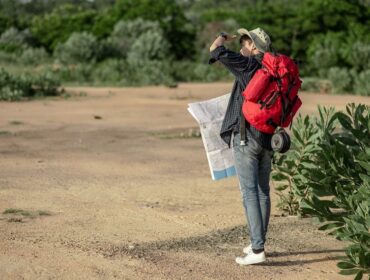You’ve probably seen it—someone’s campsite trashed with plastic cutlery, forgotten cans, and that one lonely sock no one wants to claim. It’s not just bad form—it’s the opposite of what camping should be. These days, it’s not enough to just enjoy nature. You have got to respect it. And that starts with what you pack. If you’ve been Googling camping gear essentials or scrolling for things to bring camping without the waste, you’re in the right place.
This isn’t about overpacking or going full wilderness survival mode. It’s about eco-friendly camping gear that’s smart, reusable, minimal, and actually built to last. Whether you’re a first-timer or someone ready to clean up their camping game, we’re keeping it practical, sustainable, and low-stress.
Grab your checklist. Let’s get into the good stuff—without leaving behind the bad.
1. Shelter Without the Footprint

Your tent is home base. Make it count—and make it clean. Skip the cheap nylon shelters that tear by trip two. Invest in a tent made with recycled fabrics, PFC-free waterproofing, and non-toxic dyes. Look for companies that use ethical labor and offset their supply chain emissions. The Sierra Designs Meteor 2 Person Tent is ideal for eco-conscious weekend campers. Its full mesh body offers airflow and stargazing, while the PFC-free rainfly keeps you dry and green. Packs down small, goes up fast—zero stress, all comfort.
You’ll sleep better knowing your gear didn’t cost the earth—even if the squirrels throw a party outside your flysheet.
2. Kitchen Setup That Doesn’t Scream Plastic

Camp cooking gets wild fast—packets, plastic, disposable everything. But it doesn’t have to. Stainless steel mess kits like Primus Campfire Prep Set, bamboo utensils, and silicone food storage pouches can handle heat, dirt, and repeat use.
One of the smartest things to bring camping? A reusable coffee filter or French press. It cuts down waste and starts your day strong. The Jetboil Grande Coffee Press is made from durable silicone. It brews up to two cups at once, cleans easily, and packs down flat so it won’t take up extra space in your gear.
Also, swap single-use propane for refillable fuel canisters or invest in a stove that runs on renewable alcohol or wood. The MSR IsoPro 4oz canister delivers a clean, consistent burn, even in cold or windy conditions. Its compact size makes it perfect for weekend trips or minimalist packs, and the isobutane-propane blend means faster boils with less waste. Pair it with your camp stove for efficient, no-drip cooking that respects both your time and the environment.
And for cleanup? Biodegradable soap, a collapsible wash bin, and reusable microfiber cloths. Mother Nature prefers you pack out your waste, not leave it in her sink.
3. Sleep System That’s Cozy and Conscious

You don’t need five layers of synthetic fluff to stay warm at night. Look for sleeping bags and pads made with recycled insulation and Bluesign-certified materials. Brands now offer down alternatives that mimic warmth without the animal impact. The NEMO Disco Endless Promise 30° Sleeping Bag brings side-sleeper-friendly design, cozy down insulation, and 100% recycled fabrics into one sustainable package. It’s built to last and built to be recycled when its journey ends.
Pair it with the Therm-a-Rest Trail Pro Max Sleeping Pad, which offers plush, self-inflating support and serious insulation for year-round comfort. Both pieces prioritize performance and eco-conscious construction, proving you don’t have to choose between comfort and responsibility when packing for the wild.
Your camping gear essentials list should always include a sleep setup that keeps you comfortable—and keeps trash out of the ecosystem.
Set up your tent, try your stove, and break in your layers at home so nothing surprises you in the wild.
4. Light, Power, and Minimal Impact

Lighting up your site shouldn’t mean burning through batteries. Solar-powered lanterns and USB-rechargeable headlamps are game changers. The Flextail Max 3-in-1 Vintage Lantern does more than just glow; it offers soft ambient light, a flame-like flicker mode, and built-in power bank functionality in a compact, rechargeable body. Pair it with the EcoFlow 110W Folding Solar Panel Charger, and you’ve got a clean, renewable energy loop that powers your gear straight from the sun. It folds flat, sets up fast, and charges your lantern, phone, or power station without relying on disposable batteries. Together, they bring smart energy and soft lighting to your basecamp—no outlet required.
One thing people forget? Turn lights off when not needed. Light pollution affects wildlife, and stars beat LEDs every time.
5. Clothes That Don’t Cost the Earth

You don’t need a new wardrobe to go camping—just smarter pieces. Stick to layers made with organic cotton, merino wool, or recycled polyester. These are breathable, odor-resistant, and don’t shed microplastics like cheap synthetics do.
Stay dry, stay cool, and stay eco-conscious with the Pinnacle 180 Merino Base Layer. Made from natural, renewable merino wool, this lightweight short sleeve top regulates temperature, resists odor, and keeps you comfortable from trailhead to tent.
If you’ve got kids? Hand-me-downs are the most eco move. Camp dirt doesn’t care what brand you wear.
6. Hygiene Without the Harm

Soap, wipes, toothpaste—all things that sound harmless until they end up in a stream. For your list for camping, stick to biodegradable, unscented basics. Dr. Bronner’s is a classic, but plenty of new brands do low-waste, skin-safe products that won’t disrupt ecosystems.
The Sea to Summit Wilderness Wipes offer a biodegradable option for trail cleansing without harsh chemicals. Pair that with Sea to Summit’s Trek & Travel Liquid Soaps—gentle, concentrated, and safe for natural water sources—and your camp hygiene stays simple and sustainable. Dry off with the MicroNet Tactical Micro Terry Towel, designed to be ultra-absorbent, fast-drying, and reusable for the long haul. Together, these essentials prove you can keep your body clean and your conscience even cleaner.
The goal here: keep yourself clean without trashing the trail.
Final Thoughts: Your Gear, Your Impact
You don’t have to be perfect. You don’t have to overhaul every item overnight. But every swap you make on your camping gear list matters. Less waste and less plastic mean less guilt when you’re soaking up that forest air.
Camping is about connection with people, land, and the peace that comes from being out there. The right gear supports that. It gets out of the way and lets the moment shine.
So next time you’re prepping for a trip, look at your stuff. Ask, “Will this last? Can I reuse this? Does this help me leave no trace?”
Because the best campsite? It’s the one no one can tell you were ever there.
FAQ: Camping Gear Essentials and Low-Impact Packing
What are the most important camping gear essentials for beginners?
A good tent, warm sleeping bag, basic cook setup, reliable light source, and weather-ready clothing are a solid start.
What are eco-friendly things to bring camping?
Reusable cookware, refillable water bottles, solar lights, biodegradable soap, and gear made from recycled or natural materials.
What’s on a full camping gear list for an eco-conscious camper?
Think durable tent, secondhand gear if possible, waste-free toiletries, reusable food containers, and a leave-no-trace attitude.
How do I know if a product is sustainable?
Look for certifications like Bluesign, B Corp, or recycled content. Also check if the company uses ethical labor or carbon offsets.
What’s the easiest swap to make for greener camping?
Start with ditching disposables—plates, cups, cutlery—and replacing them with lightweight, reusable alternatives.





